Advantages and Disadvantages of a Saltwater Swimming Pool
Shop Prescription Swim Goggles

Saltwater swimming pools were once limited to cruise ships and beach-side hotels; however, they've become increasingly popular among residential homeowners in recent years. The use of saltwater alters the pool's characteristics in a way that many people prefer. Of course, there are both advantages and disadvantages associated with saltwater swimming pools, which we're going to discuss further in this post.
The main difference between a freshwater and saltwater swimming pool lies in the chlorination process. Heavy amounts of chlorine (usually in liquid or tablet form) are added to freshwater pools to kill E.coli and other potentially harmful the bacteria. Without chlorine present, bacteria would be able to grow and thrive in the stagnant water.
Saltwater swimming pools use chlorine for the same purpose, but it's added in the form of gas. A typical saltwater pool has a powered generator that turns salt into the chlorine gas. Rather than manually adding chlorine, the generator automatically does it for you.
Advantages of Saltwater Swimming Pools:
> Constant chlorination. Arguably, one of the greatest advantages of saltwater swimming pools is the steady supply of chlorine flowing through the water. Swimmers in freshwater pools are only protected from bacteria when chlorine is added, whereas saltwater pools are constantly being chlorinated by the generator.
> Less eye irritation. You might be surprised to learn that saltwater swimming pools are less likely to irritate your eyes than a freshwater pool. This is due to the fact that saltwater pools use a fraction of the chlorine as their counterpart.
> Softer water. The water in a saltwater swimming pool contains fewer minerals and impurities than water in a freshwater swimming pool thanks to a chemical process known electrolysis. People with skin allergies and/or sensitive skin may benefit from swimming in a saltwater pool.
> Although they cost more to set up, saltwater swimming pools are actually cheaper to maintain.
Disadvantages of Saltwater Swimming Pools:
> Costs more. Saltwater swimming pools tend to cost more to set up and install than freshwater pools.
> More complicated to use and maintain. Some people will argue that saltwater swimming pools are more complex and difficult to maintain. The solution to a dirty freshwater swimming pool is to add more chlorine but this doesn't work with saltwater pools.
> Salt may corrode and damage metal parts. Granted, ocean water contains about ten times the salt concentration as the water inside a saltwater swimming pool but it's still worth noting that salt promotes the corrosion of certain metals.

 Canadian Dollar (CAD)
Canadian Dollar (CAD)
 Euro (EUR)
Euro (EUR)
 British Pound (GBP)
British Pound (GBP)






